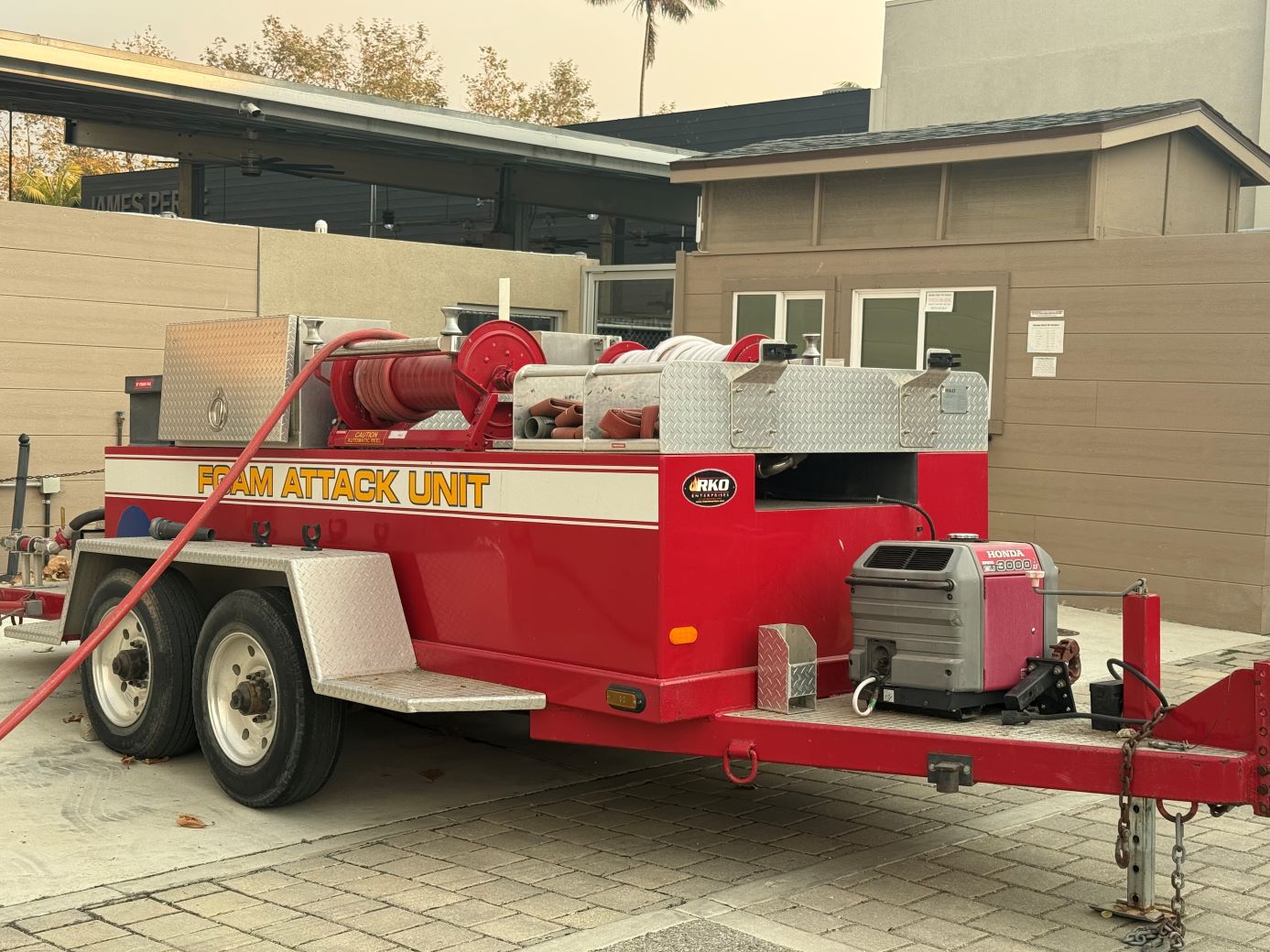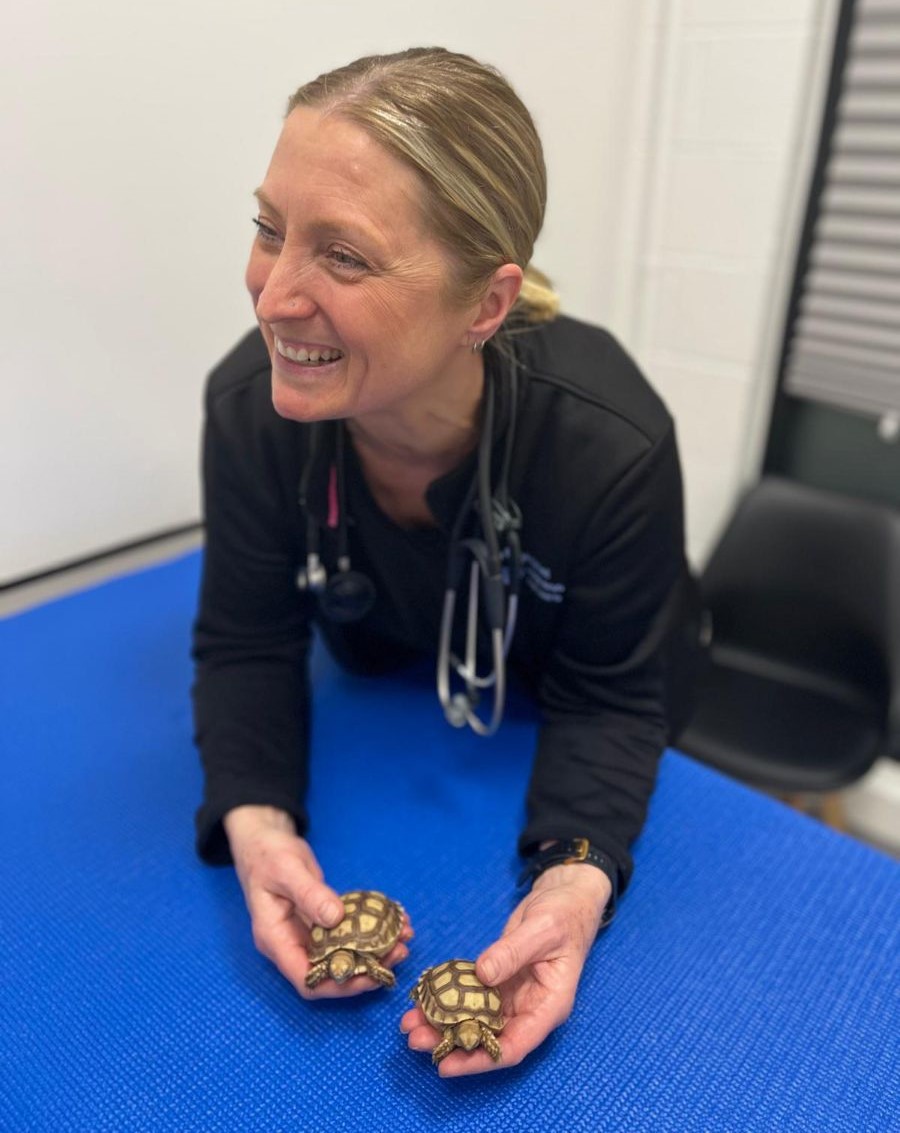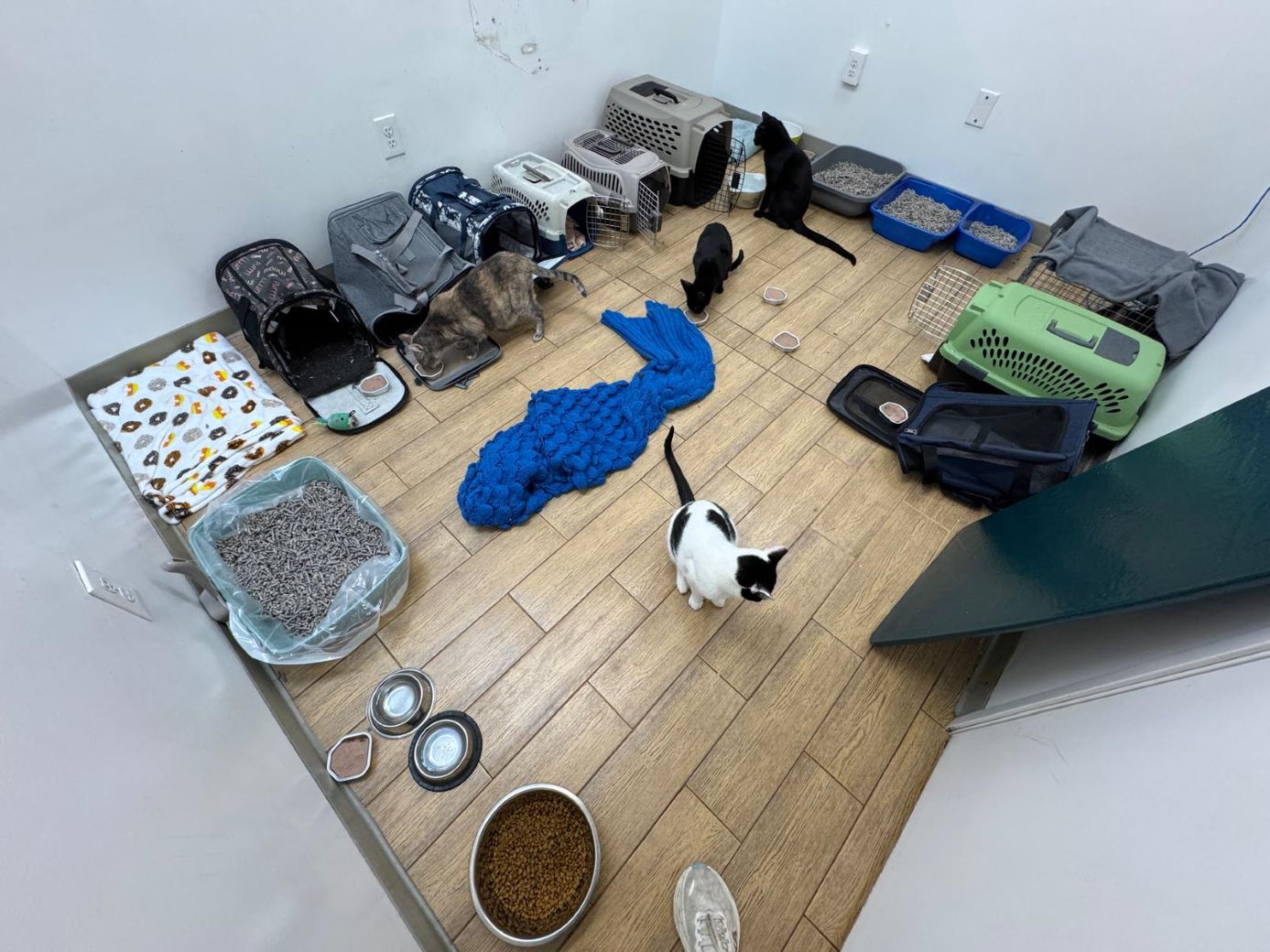Dr. Dean in fire gear

Photo by Dr. Dean Graulich
Twice in the past two months, Dr. Dean Graulich has geared up to defend his Malibu practice against flying embers. He was not able to do anything to protect a satellite clinic in the Pacific Palisades neighborhood that was destroyed early this month.
 Listen to this story.
Listen to this story.
Whether treating pets for smoke inhalation, finding homes for displaced animals or donning a firefighter suit to protect a clinic, veterinarians are very much in the thick of the wildfire disaster gripping Los Angeles.
The wildfires, many still blazing, have been among California's most deadly and destructive. Since early January, the two largest — the Palisades and Eaton fires — have razed thousands of homes, killed at least 28 people and prompted evacuations of nearly 200,000 more, many with pets.
Practitioners have continued to serve people and animals even as they face personal challenges, including practices and homes in jeopardy or destroyed. These are some of their stories.
'I'm constantly having to deal with this'
As the Palisades Fire roared west along the Pacific Coast Highway in early January, Dr. Dean Graulich was scrambling to protect the Malibu Coast Animal Hospital that he owns with his wife.
The couple had lost a satellite clinic in the Pacific Palisades neighborhood in the first 24 hours of the blaze, and Graulich didn't want their remaining clinic to meet the same fate.
With animal boarders moved to hospitals farther from the fire zones and a trailer loaded with fire-suppressing foam and 1,000 gallons of water parked out front, he was ready to quench any dangerous ember carried his way by the wind.
Fortunately, his corner of Malibu has so far been spared, but the practice has not always been able to receive patients. Authorities closed roads in the area, cutting off easy access to the hospital, making it one of many businesses outside evacuation zones that were effectively closed for several days.
Since they've started seeing pets again, half-hour appointments routinely run long, Graulich said. The clients, many of whom had homes destroyed or badly damaged, are long-time regulars seeking routine care for their pets, not treatment for fire-related injuries. Conversations, however, inevitably veer from the patient to the fire and its aftermath.
The Graulichs are particularly well-informed and compassionate sounding boards, as they'd been through it years earlier when they lost their Malibu home in a 2018 fire.
Graulich spoke by phone this week to a VIN News Service reporter. His wife, Dr. Dana Graulich, who often worked at the Palisades practice, wasn't ready to talk to the press, he said.
"She is the veterinarian for most of the people affected by the fire, making her the closest connection to those who are suffering this loss," he explained. "It's really hard for her to work and talk about it all day."
After losing their home in 2018, the Graulichs rebuilt — this time with plenty of concrete, a fire-proof roof and outdoor sprinklers. They also leaned into other preparations in the hope of preventing history from repeating itself or, at least, keeping safe.
Dana Graulich took the lead in establishing evacuation plans for their homes and practices. Dean Graulich took online fire safety training, sought advice from retired firefighters and purchased protective gear and equipment.
He's stood sentry at the practice before — just last month when another fire looked like it would encircle Malibu.
"I'm constantly having to deal with this," he said.
Foam_trailer

Photo by Dr. Dean Graulich
For the past two weeks, Dr. Dean Graulich's foam attack unit has been parked outside the Malibu Coast Animal Clinic that he owns with his wife. The trailer delivers a foam and water solution that suppresses flame.
The Palisades clinic was in a strip of stores that couldn't easily have been defended, even if the fire hadn't been so fast and overpowering, he added.
The Graulichs shifted all the employees to the Malibu location. "I'm trying to keep employed everyone who wants to be employed," he said. One team member lost their rental home, and many have seen their commutes increase by as much as one hour each way. In addition, the double whammy of back-to-back fires has hurt the clinic's kennel business.
One lesson for Graulich that he wants to pass on to veterinarians is to be sure you have enough buffer in the bank to meet payroll, pay credit cards and cover other expenses if your clinic is closed for a number of days due to a disaster.
"Business interruption insurance isn't right away," he said.
He also encouraged practice owners to seriously plan for natural disasters in a way they might never have before.
Graulich also took the opportunity of an interview to extol his community. "There are so many people reaching out that want to help rebuild the hospital," he said. "It's amazing when you have dedicated clients. These people would do anything for us."
Vendors, from diagnostic laboratories to supplement makers, are also pitching in. He said company representatives have dropped by with lunches for staff, offered to replace Palisades clinic equipment at no cost, and agreed to extend payment deadlines. He's hesitant to take advantage of the latter offer, he said, "because eventually you have to pay."
Dr. Annie with tortoises

Photo by Dr. Annie Harvilicz
Dr. Pernilla Edstrom of Animal Wellness Centers treats two evacuated pet tortoises.
Graulich is eager to rebuild in the Palisades.
"I'm 55; I've been through all this stuff. I realize everything we've gone through, we get to the other side, and we're OK," he said. "I just know it's going to be fine."
'I feel super proud to be a veterinarian right now'
Dr. Annie Harvilicz opened the doors of her new clinic in Marina del Rey on Dec. 30, having moved from a space just down the street, which now sat vacant. While she still had the lease on the empty clinic, she had no plans to use it again.
That all changed a week later when the fires broke out.
Harvilicz is the founder and chief medical officer for Animal Wellness Centers and founder of the Animal Wellness Foundation, a more than 10-year-old nonprofit dedicated to animal rescue.
Quickly surmising that her empty clinic could be a safe place for displaced pets, she put out a call on social media. The response was strong and immediate. She began hearing from people who had been evacuated but hadn't found a place to stay that would accommodate their pets.
She got very little sleep in the first week, she said, "answering people's emails, answering people's phone calls, trying to connect people who have needs with people who have resources — supporting people as they're getting evacuated."
At first, it was mostly logistical coordination. Harvilicz, along with a growing team of volunteers, helped arrange foster situations and provided shelter for animals they couldn't place. As the animals come in, her team examines them and makes sure they're OK and up to date on vaccinations.
In the past two weeks, she estimates close to 100 animals have come through the clinic, though thanks to foster coordination efforts, many don't stay long. Harvilicz recalls one pet owner who was desperate to board her Australian shepherd and Chihuahua but not having any luck until Harvilicz connected her with a client whose dog had recently passed away.
cat room

Photo by Dr. Annie Harvilicz
Animal Wellness Centers' former exam room converted into a safe place for displaced cats.
"She came in at 11:30, and at one o'clock, I got pictures of her dogs on a couch all happy in this woman's house," Harvilicz said.
After the first week, Harvilicz connected with search and rescue teams. As a result, she's treating more animals experiencing fire-related issues, such as smoke inhalation, malnutrition and respiratory problems.
"They've been bringing me some patients from actually behind the fire lines," she said.
Harvilicz has turned the treatment area of her former clinic into a "free pet store," where people can pick up donated pet food and supplies. This week, she and her volunteers drove some supplies to churches and shelters.
Next, she'd like to set up a temporary wildlife shelter. The problem is that Harvilicz has not connected with anyone who is able to rescue wildlife.
"The ideal situation would be to have a veterinarian or wildlife rehabber that could help set it up," she said. "If there's anybody around that can help with wildlife, I would love to connect with them."
Where to help, where to be wary
For now, Harvilicz plans to keep the lease on her former clinic space and is hoping to enlist more specialists to answer questions about new, unfamiliar patients. She's hosted tortoises, cockatoos and more.
Long term, she wants to harness some of the community she's built during this process to create a veterinary emergency response council for future disasters.
"I feel super proud to be a veterinarian right now," Harvilicz said, "because it's just been so great how many vets have stepped up to help."
'You just know you're going to get through it'
Dr. Henry Pasternak was tending to cats and dogs in his West LA clinic on Jan. 7 as the largest of the fires bore down on the Pacific Palisades neighborhood where he lived with his wife, Glorrie, and adult daughter, Ellie Rose. But he wasn't too worried.
"We've had fires in the past," he told VIN News a week later. "We never had to abandon the house before."
He was less placid when he learned by text that Glorrie was evacuating and heading to the clinic with the couple's four dogs, one cat and geckos.
Ellie Rose arrived from the neighborhood later. "When she got here, she was covered in ash," said Glorrie Pasternak, who manages the one-doctor practice.
By morning, they learned their home of 35 years had been decimated. With nowhere to go, father, mother and daughter decided to make the clinic their temporary home.
That day, and every following weekday and Saturday, Pasternak continued his general practice routine. He performed surgeries and dental work, took blood, examined animals — "all the regular things," he said. "People still want to see me. I'm still going to see everybody."
Most clients, Pasternak said, had no idea he'd lost his home, even though he wore the same clothes for 12 days straight and went longer than usual between shaves.
"Working helps," Glorrie said. "It heals you."
The clinic office became a hub. During the day, the dogs remained there, out of the way. At night, they were allowed to roam around the 5,000-square-foot clinic. That's when the family took their shift in the office, sleeping on makeshift beds that eventually included a donated air mattress.
As always, this past Sunday, the Pasternaks closed the practice for the day. They planned to use the time to buy clothes and basic supplies, to move into a rental home in Culver City, and to take their first real showers in nearly two weeks.
On Monday, they were back, providing veterinary care as usual.
"It's not easy," Pasternak said. "You just know you're going to get through it. You have no choice."
Pasternak plans to rebuild the family home and expects it may take several years. Meanwhile, there are positives to look forward to at the practice. The Pasternaks' son, a fourth-year student at Virginia-Maryland College of Veterinary Medicine, plans to start working alongside his dad this summer.